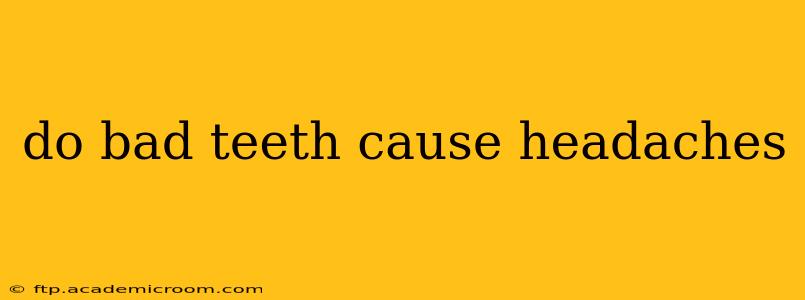Many people experience headaches, and while the causes are varied, the connection between dental health and headaches is a surprisingly common one. So, do bad teeth cause headaches? The answer is a resounding, sometimes. It's not a direct, always-present link, but poor oral hygiene and dental problems can absolutely contribute to headaches, often through a complex interplay of factors.
What Types of Dental Problems Can Cause Headaches?
Several dental issues can trigger headaches. Let's delve into the most common culprits:
1. Temporomandibular Joint (TMJ) Disorders:
TMJ disorders affect the jaw joint and the muscles controlling jaw movement. Symptoms can include jaw pain, clicking or popping sounds in the jaw, difficulty opening your mouth wide, and, significantly, headaches. The pain can radiate to the temples, forehead, or even the back of the head. The connection is direct; the muscles and nerves in the jaw are closely linked to those in the head.
2. Tooth Infections (Abscesses):
A severe tooth infection, or abscess, involves pus accumulating at the root of the tooth. This infection can cause intense pain, localized swelling, and, importantly, referred pain that manifests as a headache. The inflammation and pressure from the infection can trigger nerve signals that lead to headaches.
3. Bruxism (Teeth Grinding):
Bruxism, the unconscious grinding or clenching of teeth, is a common cause of headaches, especially tension headaches. The constant pressure on the jaw muscles and teeth can lead to muscle fatigue, pain, and headaches. This is often worse at night, and people may not even be aware they're doing it.
4. Dental Procedures and Trauma:
Even routine dental procedures, such as extractions or fillings, can sometimes trigger temporary headaches. Similarly, trauma to the jaw or teeth, such as a blow to the face, can result in headaches due to inflammation and injury to surrounding tissues.
How Do Bad Teeth Lead to Headaches? The Mechanisms
The link between poor dental health and headaches isn't always straightforward. Several mechanisms can be at play:
- Muscle Tension: Jaw muscle tension from TMJ disorders or bruxism can lead to tension headaches. The tight muscles restrict blood flow and irritate nerves, creating pain.
- Inflammation: Infections and injuries in the mouth trigger inflammation, which can spread, affecting nearby nerves and causing referred pain in the head.
- Nerve Irritation: Nerves in the jaw and face are interconnected with those that innervate the head. Inflammation or pressure on these nerves can transmit pain signals to the brain, resulting in headaches.
How Can I Tell If My Headache is Related to My Teeth?
This is crucial. Not all headaches are caused by dental issues. However, if your headache:
- Is localized in the jaw, temples, or forehead.
- Is accompanied by jaw pain, clicking, or difficulty opening your mouth.
- Is worse when you chew or bite down.
- Is associated with a toothache, swelling, or sensitivity.
Then, it's highly advisable to consult a dentist to rule out any dental-related causes.
Can a Dentist Treat Headaches Caused by Teeth?
Yes, in many cases, a dentist can play a vital role in treating headaches linked to dental problems. Depending on the underlying cause, treatment might involve:
- TMJ treatment: This could include splints, physical therapy, or medications.
- Treatment of tooth infections: This usually involves root canal therapy or extraction.
- Bruxism management: This often involves wearing a mouthguard at night.
What if My Headache Isn't Dental-Related?
If your dentist finds no dental issues, your headache may stem from other factors, such as stress, dehydration, or underlying medical conditions like migraines. Consult your doctor or a neurologist for further evaluation.
Does Fixing My Teeth Guarantee Headache Relief?
While addressing dental issues can significantly improve headaches resulting from those problems, it doesn't guarantee complete relief. Other underlying conditions may also contribute to your headaches, and addressing those may be necessary.
In conclusion, while not always the sole cause, bad teeth can certainly contribute to headaches. Regular dental checkups, good oral hygiene, and promptly addressing any dental issues are crucial steps in maintaining both your oral health and overall well-being, potentially preventing headache issues down the line. Always consult a healthcare professional if you're concerned about persistent headaches.
